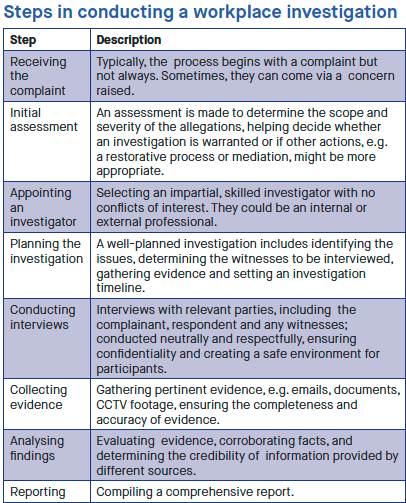
Author : Kerry Tattersall – Baker Tilly Staples Rodway employment relations/HR consultant, licensed private investigator
Are you an employer dealing with a serious incident or ongoing situation involving a critical breakdown of processes or relationships? If so, you’ll know it’s a knotty time, often bringing multiple “he said / she said” perspectives and accounts.
You could deal with it on your own but it’s safest to hire a Licensed Private Investigator, who’ll get to the heart of what happened then present you with their findings Workplace dynamics have shifted in recent years from leadership “command and control” to a more empathetic, people-centric style, with greater acknowledgement of the intersection between personal and professional lives. Add into the mix employment legislation that provides a high bar of rights for employees, and you have a melting pot of complexity to navigate. Employers are obliged to act in good faith, be fair and reasonable, and protect their staff from harm.
As an employer, you may find yourself with a situation that requires investigating, including internal allegations of fraud, bullying, harassment, discrimination or any matter where bias is alleged. Before you dust off your trench coat, assess whether you have the time and expertise to conduct an investigation. There are stringent criteria for procedural fairness, so outsourcing to an expert can mitigate risk of an employment dispute, especially if the situation is complex or sensitive.
Workplace investigations are multifaceted, requiring a deep understanding of employment laws, organisational policies and investigative techniques. Unlicensed or inexperienced individuals may inadvertently overlook critical details, leading to incomplete or biased outcomes. A licensed workplace investigator brings a wealth of knowledge and specialised skills to the table, ensuring a thorough and impartial investigation.
How does it work?
A common misconception is the private investigator will facilitate the entire process for you, when their engagement only covers the investigation component. They are only establishing and documenting the facts and will not influence any actions or outcomes. Impartiality is key to investigations. Licensed workplace investigators approach cases without preconceived notions, focusing solely on facts. This objectivity is crucial in building trust among employees and ensuring that the findings are credible and defensible. A common misconception is the private investigator will facilitate the entire process for you, when their engagement only covers the investigation component. They are only establishing and documenting the facts and will not influence any actions or outcomes.
Impartiality is key to investigations. Licensed workplace investigators approach cases without preconceived notions, focusing solely on facts. This objectivity is crucial in building trust among employees and ensuring that the findings are credible and defensible. An external investigator will draft a “terms of reference”. This is critical, as it provides the scope, along with the name of the decision maker and any other relevant details.
The investigator then reviews applicable information and conducts interviews with relevant parties, before providing a report on the findings. The employer will then consider the report when deciding what, if any, action to take. However, they should not just accept the findings; if the matter was an allegation of misconduct, then a normal disciplinary process should follow.
Why regulate this work?
In 2020, the Private Security Personnel Licensing Authority clarified that external parties engaged to complete a workplace investigation fall under the definition of a private investigator under the Private Security Personnel and Private Investigators Act 2010, and must be licenced to undertake such work. This ensures that only those with adequate training and skills are approved, and provides an independent avenue should there be recourse or complaints about investigators’ conduct.
Steps in conducting a workplace investigation



